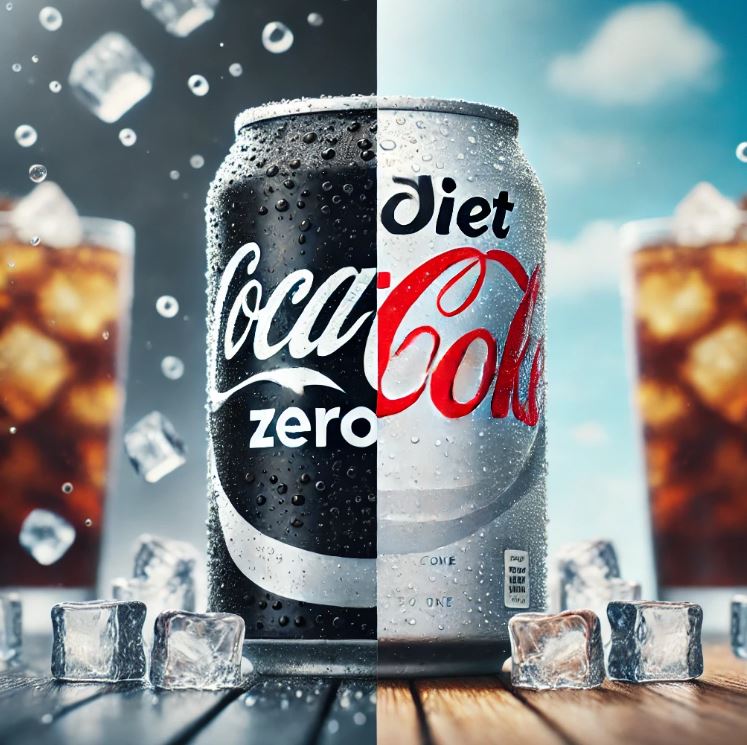Coke Zero and Diet Coke are two of the most popular sugar-free sodas in the world. While both are marketed as healthier alternatives to regular Coca-Cola, many people wonder what the real differences are between them. From their ingredients and taste to their marketing strategies, there are several key distinctions that set these two beverages apart. This article will explore these differences, helping you make an informed choice the next time you’re craving a sugar-free soda. You’ll soon know the difference between Coke Zero and Diet Coke.
Key Takeaways
- Coke Zero and Diet Coke differ primarily in their flavor profile and ingredients.
- Diet Coke has a distinct taste due to its unique blend of artificial sweeteners, while Coke Zero is formulated to taste more like regular Coca-Cola.
- The choice between the two often comes down to personal preference for taste and specific dietary needs.
Ingredients and Flavor Profiles
Diet Coke
Diet Coke was introduced in 1982 as the first sugar-free version of Coca-Cola. It was created to offer a low-calorie option with a lighter taste compared to the original.
Ingredients:
- Carbonated water
- Caramel color
- Aspartame (an artificial sweetener)
- Phosphoric acid
- Potassium benzoate (to protect taste)
- Natural flavors
- Citric acid
- Caffeine
Flavor Profile: Diet Coke has a distinct, crisp taste that is lighter than regular Coca-Cola. The use of aspartame gives it a unique flavor, which some people find to be slightly more acidic and less sweet than other sodas.
Coke Zero
Coke Zero, also known as Coca-Cola Zero Sugar, was introduced in 2005. It was designed to closely mimic the taste of regular Coca-Cola while being sugar-free and low in calories.
Ingredients:
- Carbonated water
- Caramel color
- Phosphoric acid
- Aspartame and acesulfame potassium (a blend of artificial sweeteners)
- Potassium benzoate (to protect taste)
- Natural flavors
- Potassium citrate
- Caffeine
Flavor Profile: Coke Zero is formulated to taste almost identical to regular Coca-Cola. The blend of aspartame and acesulfame potassium provides a sweetness that is closer to sugar, giving it a richer and fuller flavor compared to Diet Coke.
Nutritional Information
Both Coke Zero and Diet Coke are marketed as zero-calorie beverages, making them popular choices for those looking to reduce their calorie intake without sacrificing flavor.
Diet Coke:
- Calories: 0
- Total Fat: 0g
- Sodium: 40mg
- Total Carbohydrates: 0g
- Sugars: 0g
- Protein: 0g
- Caffeine: 46mg per 12 oz can
Coke Zero:
- Calories: 0
- Total Fat: 0g
- Sodium: 40mg
- Total Carbohydrates: 0g
- Sugars: 0g
- Protein: 0g
- Caffeine: 34mg per 12 oz can
The nutritional profiles of both beverages are nearly identical, with the main differences lying in their caffeine content and taste.
Marketing and Branding
Diet Coke
Diet Coke has long been marketed towards individuals seeking a lighter, low-calorie beverage. Its branding emphasizes a clean, crisp taste and a lifestyle-oriented approach, often featuring sleek, stylish packaging.
Coke Zero
Coke Zero’s marketing focuses on delivering the same great taste as regular Coca-Cola without the sugar. Its campaigns often highlight the idea of “zero compromise” on flavor, appealing to those who want the full Coca-Cola experience without the calories. The branding is bold and modern, aiming to attract a younger demographic.
Recent Developments
As of June 20, 2024, both Coke Zero and Diet Coke have seen various updates and limited-edition flavors to keep the brands fresh and appealing. Coke Zero introduced a new formula in 2023, further refining its taste to be even closer to regular Coca-Cola. Diet Coke, on the other hand, has expanded its flavor lineup with variants like Ginger Lime and Blueberry Acai, catering to diverse taste preferences.
Top Experts and Entities in the Field
Several experts in the beverage industry have commented on the evolution and popularity of Coke Zero and Diet Coke. Beverage industry analyst Duane Stanford has noted the strategic branding and formulation differences that cater to different consumer preferences. Additionally, the American Beverage Association has highlighted these products in discussions about sugar reduction and healthier beverage options.
Key Takeaways – Difference Between Coke Zero and Diet Coke
- Diet Coke and Coke Zero are both zero-calorie sodas, but they have different flavor profiles and ingredients.
- Diet Coke has a lighter, more acidic taste, while Coke Zero closely mimics the flavor of regular Coca-Cola.
- Recent developments include new flavors and formula refinements to meet changing consumer preferences.
Conclusion
Understanding the differences between Coke Zero and Diet Coke can help you choose the right beverage to suit your taste and dietary preferences. Whether you prefer the lighter taste of Diet Coke or the classic flavor of Coke Zero, both options offer a refreshing, sugar-free alternative to regular soda.
Author: HowDiff
HowDiff is an expert in identifying and explaining the differences between various subjects, helping people understand subtle distinctions and unique characteristics with clarity and insight.
